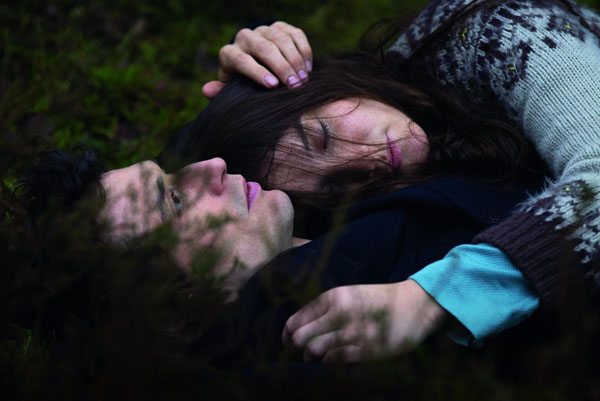“This buttock-clenchingly embarrassing movie from director Valérie Donzelli,” begins the Guardian‘s Peter Bradshaw, “is a pre-Revolutionary period drama from the quality end of the sugary French market—theatrically tricked out with one or two annoying and clumsy Brechtian touches of stylized self-aware modernity. It is based on the true story of forbidden love between two aristocratic siblings, Marguerite and Julien de Ravalet, executed in 1603 for adultery and incest, and the movie endows them with a grisly Abelard-and-Heloise-style pomposity and shrill self-importance, absolutely without eroticism or romance. They are played by Anaïs Demoustier and Jérémie Elkhaïm… Raoul Fernandez plays Lefebvre, the dull fellow to whom poor, pouting Marguerite’s family try marrying her off and—incredibly—Geraldine Chaplin plays his mum, with a peevish scowl and odd, almost Pierrette-style makeup.”
Donzelli and Elkaïm have adapted the screenplay from “an unused François Truffaut script,” notes the Telegraph‘s Robbie Collin, “and she uses the same kind of playful techniques deployed by Truffaut in films like Jules & Jim—irising in and out on images… or staging scenes as freeze-frame-like tableaux that suddenly spring to life. Yet nothing beneath Marguerite & Julien’s fussy surface suggests any kind of understanding of why Truffaut’s films were and remain so exhilarating and surging with life. Instead, Donzelli’s film plays out with plodding straightforwardness, one scene following on from the next with almost no time for reflection, or the building of erotic tension, or a sense of scandal, or anything else.”
“It’s a medieval story, but with ’50s cars and radios,” notes Barbara Scharres at RogerEbert.com. “I was stunned by the stylistic aberration of a montage of still photos with voiceover from a Shangi-Las number at a crucial juncture near the end, but I stayed to see how bad it could get. The answer: pretty bad.”
“This is the filmmaker’s first film in the Cannes competition, though she did get a taste of the Croisette when her hit Declaration of War opened the Critics’ Week in 2011,” notes Boyd van Hoeij in the Hollywood Reporter. “However, her latest… has a snowball’s chance in hell of being as rapturously received across the board.”
It’s “painfully silly,” agrees Jay Weissberg in Variety, but Screen‘s Lee Marshall allows that it “sometimes lives up to its own immense self-belief.”
Updates, 5/20: For Ignatiy Vishnevetsky at the AV Club, this “may be the most goddamn confounding thing I’ve seen so far at Cannes—and that’s saying a lot, considering that the Main Competition already includes such bona fide oddities as The Lobster, Sea of Trees and Tale of Tales. Valérie Donzelli’s fable has the camera style of a mid-’70s Italian film (zooms, diffusion filters, etc.), the production value of a film school thesis project, and the plotting of an early Guy Maddin movie.” It’s “an extended flight of fancy that continually reveals itself as a failure of imagination, at once highly stylized and effectively style-less. It is, in other words, perversely watchable.”
“Anaïs Demoustier (Bird People) gives an impassioned performance as the older Marguerite, acting circles around costar Jérémie Elkaïm,” grants Mike D’Angelo at the Dissolve, “but there’s only much she can do.” More from Donald Clarke (Irish Times) and Fabien Lemercier (Cineuropa).
Update, 5/22: “Anaïs Demoustier and Jérémie Elkaïm are perfectly cast,” argues Sophie Monks Kaufman at Little White Lies. “Their physical daintiness flies in the face of the supposed squalor of their actions and their well-matched beauty tempts the camera as they tempt each other. Formally unambitious as Marguerite et Julien may be, the romance is so heartfelt and the comeuppance so stirring that it prompts a first-time ever question for this writer: ‘Is incest really that bad?’ Anyone?”
Update, 5/23: Marco Grosoli in Film Comment‘s first Cannes roundtable: “The approach is completely anti-Truffaut—which could be a good thing if there is some awareness in it, but there is none. Truffaut would have clearly stretched the childhood of the characters, up until their mature love story when they’re adults. Here, the exact opposite takes place: when the two main characters are children, they’re already adult and provided with sexual tensions that read very clearly in the film, which goes in a direction that’s completely different from the one that was intended in the script. And all of the other mistakes that she makes—and there are a lot—I think come from this original fault in the way she conceives the film.”
Cannes 2015 Index. For news and tips throughout the day every day, follow @KeyframeDaily. Get Keyframe Daily in your inbox by signing in at fandor.com/daily.




